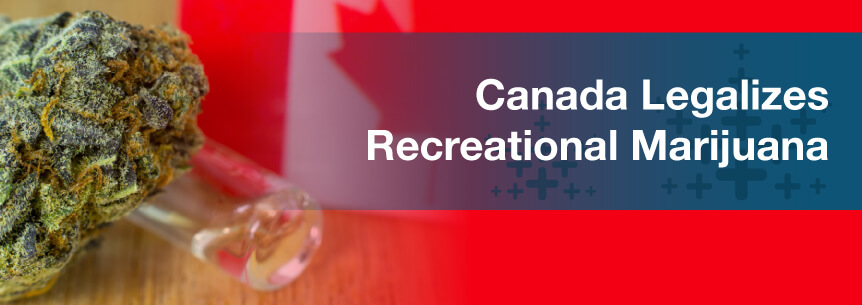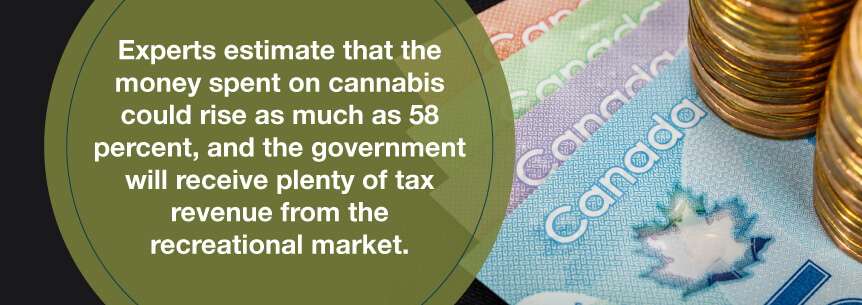
On June 20, 2018, Canada became the second country in the world to legalize recreational cannabis. Discover the facts about this historic event and the implications it has for Canada and beyond.
A year after its introduction, the Canadian Senate voted 52-29 in favor of the revised Bill C-45, or the Cannabis Act. Their passage was the final decision in the process, finishing a several-month-long process. The Canadian government initially planned to implement the bill by July 2018, but provinces and territories requested more time to put the new framework in place. So, Prime Minister Justin Trudeau announced the official legalization date as October 17, 2018.
The government also plans to look into clearing past marijuana possession charges for hundreds of thousands of Canadians and consult Indigenous leaders who felt that their voices weren’t heard during the bill’s drafting. Ideally, these efforts will help resolve some of the diversity issues Canada’s cannabis industry faces.
Like any other marijuana legalization bill, the Cannabis Act will enforce some limitations on recreational use. Many rules will depend on what individual provinces and territories decide. Provinces have some say in how the bill is implemented under their jurisdictions.
In general, Bill C-45 will legalize the following:
On the other hand, the bill will also put restrictions on specific aspects of the cannabis experience:
The state of marijuana will vary among provinces and territories, so Canadians should consult the laws that apply to their area.
While the attitude toward legalization in the United States often involves concern for children, the Liberals passed the Cannabis Act to protect youth. During Justin Trudeau’s campaign, one of his promises was to reduce access to marijuana by young people and reduce marijuana-related crime. According to their logic, putting the government in control of marijuana can help them ensure only legal users can have it. This viewpoint convinced many Canadians and helped Trudeau become Canada’s new leader.
The Liberals first introduced the Cannabis Act on April 13, 2017. It wasn’t until November of that year when the House of Commons revised and approved it. Now, the Senate has made the finishing touches and officially passed the bill.
On a cultural level, Canadians have been ready for legalized recreational cannabis for a long time. Polls consistently showed that most Canadians supported the idea. According to data collected by Statistics Canada, the use of marijuana by people over 15 more than doubled between 1985 and 2018. When considering both medical and recreational marijuana, Statistics Canada also found that Canadians spent 5.7 billion Canadian dollars on cannabis in 2017.
The passage of the Cannabis Act shows a lot of promise for recreational and medical marijuana users alike. It has the potential to make waves economically, culturally and legally.
Even though Canada already has a medical marijuana program, patients in need can still benefit from C-45. If possible, patients should still see a marijuana-friendly doctor to start medicinal cannabis treatment. However, bureaucracy and paperwork can become significant barriers to care for some people. Prospective patients can now obtain medicine after rejection by a doctor or as they work through the application process. Recreational legalization could also lead to the integration of cannabis medicine into the standard healthcare industry.

Canada’s legal marijuana market and government finances will also thrive thanks to this legislation. Experts estimate that the money spent on cannabis could rise as much as 58 percent, and the government will receive plenty of tax revenue from the recreational market. With lower numbers of people criminalized for cannabis-related activities, money focused on legal persecution can go to other programs.
As we mentioned earlier, Canada became the second country to legalize recreational marijuana on a national level. So, who was the first? Uruguay became the first nation with recreational cannabis almost five years ago in 2013. If there wasn’t much of an international impact in response to Uruguay’s decision, how will Canada make a change? The differences lie in United Nations participation and economic power.
The UN chose to ignore when Uruguay and select U.S. states legalized recreational cannabis use, but they’ll have a harder time doing so with Canada. Canada actively participates in United Nations activity, making it more likely for the organization to hear them. With such a significant player accepting recreational marijuana, the United Nations has a high chance of a future drug policy debate.
Also, Canada has more economic influence than Uruguay or a small number of U.S. states. With newly approved legalization, many nations now have interest in seeing how it will pan out. One such country could be the United States, considering the power of Canada’s marijuana stocks overwhelms the United States’.
Canada’s new law could be the tipping point for legal marijuana in the United States. While plenty of factors come into play, we could have the best chance to end prohibition yet. Stay tuned to our social media and blog updates for future information on international cannabis issues.
No Information on MarijuanaDoctors.Com should be used to diagnose, treat, prevent or cure any disease or condition. You can view our Full Disclaimer here.